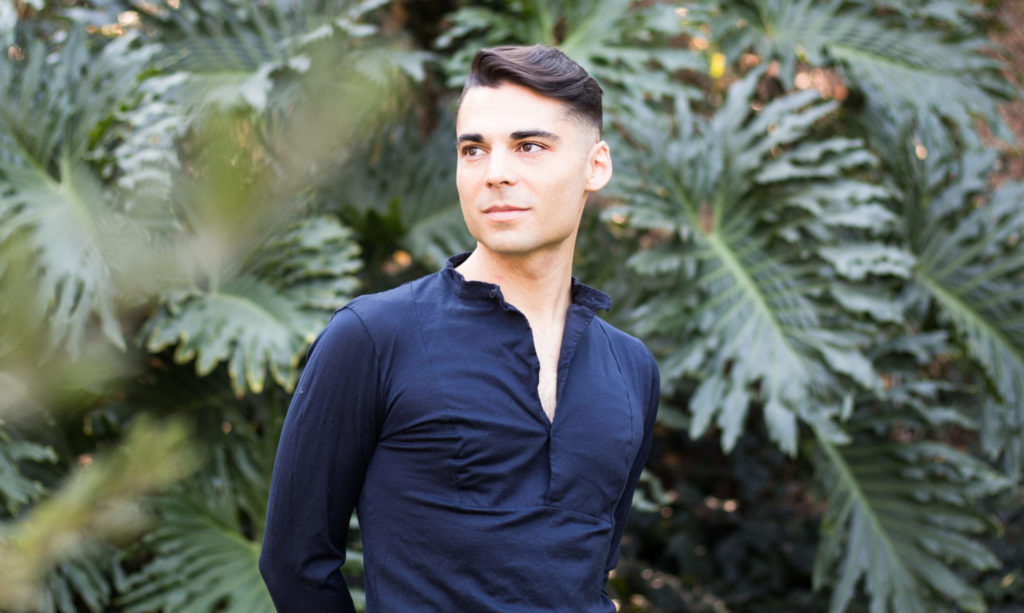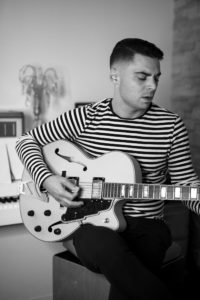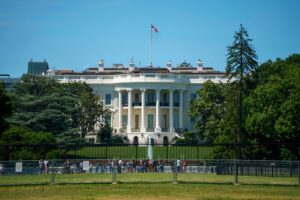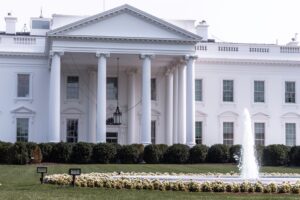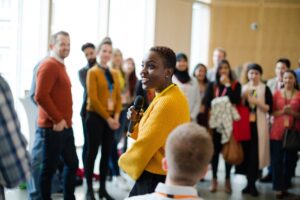Ben Caron is hard to stereotype.
We first met in a Zoom room back in November. I was invited to sit in on a post-election edition of his Re:United States Project, a discussion series encouraging cross-partisan compassion. When I learned he lived in Los Angeles (like me) and was a singer (also like me), I was humbled and surprised. Despite my better and braver angels, I’d bought into a cynical logic shared by many of my red-leaning comrades: LA + musician = progressive. And progressive = not willing to befriend Trump supporters, much less invite a dozen of them to join a Zoom call.
Since then, Ben has only continued to surprise me. After he submitted his Artist of the Month application, we mixed drinks in the backyard of the gorgeous little Hollywood house he shares with his husband. He told me about growing up in small-town Iowa. We talked about his political shift and how, as someone who once campaigned with Bush and later for Obama, it informs his bridge-building work today. And we talked about his dream music career—a multimedia vision for healing and “pop with a purpose.” Join his mailing list and enjoy his work at www.bencaroncreates.com.
Meet Ben Caron, pop singer-songwriter.
Origins
Alma Cook: Let’s start with how you got into music! What’s your origin story?
Ben Caron: I’ve been singing for as long as I’ve been speaking, so music has always been a part of my life. My teacher asked me in 3rd grade to write what I wanted to be when I grew up. I wrote “Singer/Veterinarian.” I would put on concerts for the cats in the barn (I grew up on a farm) and sing while I did my chores.
I grew up in a small town in Iowa, a town I feel really connected to these days and am glad to go home and visit. At 15, I taught myself to play guitar with an acoustic I found in the attic. Turns out my mom bought it when she was pregnant with me and had put it away once I was born. I learned to be a campfire guitarist, to play simple progressions with the book she bought to learn from.
Becoming a singer-songwriter was a way for me to express myself in a time when there was a lot I felt I couldn’t say out loud. I grew up in a culture that doesn’t have a lot of male emotional vulnerability or expressiveness. And I was a really emotional kid. Plus, I was closeted my whole young life, so I would use music as a way of expressing feelings I couldn’t say explicitly. Music was my medicine and my processing method.
Eventually, I moved to Los Angeles, originally to pursue acting. But after finding some success doing shows, I pivoted my full focus to music. I gigged in most of LA’s small venues, and I recorded my first album community-funded with my musician friends. I then self-produced an independent tour in the UK, formed a singer-songwriter’s collective, and wrote my second album, which was also community-funded.
Two albums later, I’m really into exploring the intersections of music and other healing methods, like yoga, chanting, dance, meditation, community. My live performances now include a lot of dancing, interaction, meditation, ritual, theater, and spirituality.
AC: Ok, so what’s your political origin story? What shaped your beliefs into what they are today?
BC: I’ve been thinking about this a lot recently. I don’t remember politics being very present when I was a kid, but I think that’s because as a child, my parents didn’t probably think it was appropriate to politicize my mind. My dad listened to conservative talk radio, like Rush Limbaugh, on long family car rides when I was a kid.
I don’t feel like I became politically aware until high school when we were asked for government class to participate in the Bush v. Kerry election. I remember choosing to go to a Bush rally and contact his campaign, and at the time I really liked him. My feelings for Bush have since changed.
When I went to college, I went through a massive culture shock and political shift. I went from the statistically whitest county to the most diverse public college campus in the US. My freshman roommates and friends came from many different, diverse communities, which was a huge blessing for me because I’d never really had a meaningful conversation with anyone outside my race about their experience. I had to come to terms with a lot of racial bias and prejudice that I wasn’t even consciously aware existed in me. I’m grateful that my friends and classmates and mentors over the years gave me a lot of grace and were willing to challenge me and invest in helping me to learn and grow and evolve.
I started my freshman year having just campaigned for Bush. By the time I graduated, I was campaigning for Obama and quoting feminist theory.
Ben Caron Tweet
Just to show how far my political position shifted in my time at Cal State LA, I started my freshman year having just campaigned for Bush, arguing for conservative positions on guns, race, social programs, and gender in my classes. By the time I graduated, I had chosen “Race, Gender and Sexuality” as my upper division theme, had come out, was campaigning for Obama and marriage equality, and was quoting Audre Lorde and feminist theory. In a nutshell, I started decidedly “red” and left decidedly “blue.”
In my time since college, I’ve had to really loop back around to being available to all sides of an argument. For a while, I’m not sure I made a sincere effort to understand “the other side.” I try really hard now to practice empathy and honor the importance and validity and relevance of other positions. I think balance is important, and I don’t think the liberal/blue approach is right for every situation every time.
AC: What are the political issues you care most about? How do you engage?
BC: I am pretty actively engaged on a number of issues right now, which, to me, looks like reading, researching, and educating myself on the issue, following and supporting people and organizations working in the movement, and showing up where I can to support or create impact.
If I were to narrow to top four, I would say:
- Anti-supremacism/pro-equity movements
- Bridge-building/compassion-building movements
- Compassionate immigration policy
- Economic, housing, climate and health justice
*Ben supports or volunteers with a number of organizations including the Movement for Black Lives, the Working Families Party, the Women’s March Foundation, the Human Rights Campaign, Al Otro Lado, and the Wayfarer/Be Love Foundation.
Deep Dive
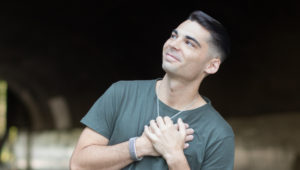
AC: Some of your songs (“Hello, I Love You,” “Love Is On The Rise,” and “Unconditional Love”) focus specifically on love as the response to the rifts we see in culture and politics. I’d love to learn more about where these songs came from and how you saw them fitting into our culture when they came out.
BC: I guess the first thing that’s important to say about my songwriting is that all of my music is written aspirationally. I say that to acknowledge that I am a deeply, beautifully flawed human being who is in constant practice toward my aspirations. I am certainly not an evolved master delivering enlightened musical edicts from a place of total self-realization. That being said…
“Love Is On The Rise” was first of the three, written in 2014. I wrote that song from a place of optimism for the future. As a queer person, the Obama years changed my life. In the 8 years of his presidency, I gained the legal right to marry, I started seeing queer people accepted and celebrated in culture, and we accessed mainstream legitimacy. Essentially, I saw unfold before me a really practical way that the power of collective love changed my life and afforded me my equal rights.
“Hello, I Love You” (co-written with my talented, visionary friend Leo Gallo in 2017) came from a conversation we had about the illusion of duality, the myth of separation, and the agency we have to choose love. We both believed that we have the power to shape our perception, and with that power, we can choose to see each other interdependently, inseparable, as a part of one another, or we can choose to see each other as the “other.” This question of who we see as the “other,” who gets included and welcomed, who belongs in the U.S., is at the heart of why human rights abuses continue against people who are looking for the same opportunity that past generations of immigrants were granted.
“Unconditional Love” was channeled through a meditation in 2017. Literally—the melody and lyrics of the chorus came through in their entirety while I was in a group meditation: “Every person, at all times, is entitled to, and worthy of, my unconditional love.” I had to leave the room and go outside and voice memo them so they didn’t disappear.
AC: Tell me about Home Again: Conversations from the Heartland and the Re:United States of America Project.
BC: I think one of our greatest areas of misunderstanding in the U.S. is across the rural/metropolitan divide. Many people I know in LA have no clue what life is like—or what people’s lived experience is—in small towns in the Midwest.
Conversations from the Heartland arose out of a personal need/desire to reconnect to and understand my home community in rural Iowa after many years of being away. I asked families and friends from my hometown, St. Ansgar, Iowa, to sit down with me to talk about their experience and their beliefs. And all I did was listen to understand, without comment, and edit/present those conversations. It was a truly transformative project and is now on my YouTube and Facebook pages.
The Re:United States Project was sort of a continuation of that need/desire, but I extended it to other rural communities, and I included friends and colleagues of mine who lived in coastal cities who were invested in better understanding our commonalities and differences. Each week we’d partner with a different rural community for facilitated conversations through Zoom, that highlighted our commonalities and shared values, before then expressing our cultural and political differences. We initially hosted the project for 6 weeks in the fall, during the election, and then after the election, pivoted to becoming much more of a discussion group. We still meet monthly to bridge-build together.
I think one of our greatest areas of misunderstanding in the U.S. is across the rural/metropolitan divide.
Ben Caron Tweet
AC: In the course of these projects, did you learn anything unexpected about your brothers and sisters across the aisle?
BC: It wasn’t unexpected, but it affirmed for me that there is just so much we have in common as human beings, and how we have mostly the same foundational needs and values, differentiated by strategies. At our core, everyone wants to be seen, heard, acknowledged, valued and understood. It also affirmed for me the importance of dissent. I’m beginning to understand the value of compassionate tension, and that even though we do have so much in common, we also need to honor our differences and diversity as well. My friend once said that “polarities exist to expand the field.” I think that’s true.
AC: As someone who’s attended a couple of your events, I’m super curious whether these projects have gotten you any pushback from colleagues or fans. Were you afraid to dive in? What’s the reception been overall?
BC: Mostly everyone celebrates and affirms that these are conversations that need to happen and are worth having. But I recognize that these events are also not everyone’s personal cup of tea—at least right now, which I respect. I had a critique from someone who felt that rural communities have undue political power compared to their population size, and that my projects, by giving voice to rural communities, exacerbate the problem. I also recently had a critique from someone who said that the bridge-building movement was a distraction from the real issue, which is not red v. blue, but actually the mega-wealthy v. everyone else.
Quick Takes
AC: Ok, something I’ve been wondering about for a while: why do most artists lean blue? As a progressive yourself, do you have any ideas about that?
BC: Okay, I’m just going to say that this is obviously a deeply biased perspective based on major generalizations, but here are two possible reasons:
First, artists are oftentimes, at some stage in our lives, social outcasts, weirdos, outsiders, eccentrics, prodigies and oddballs. Many of us have faced rejection or ostracization from conservative culture and conservative institutions. So I think liberalism has historically been a more welcoming and inclusive space for us.
Second, in my opinion, to be a great artist is to be a deeply feeling, sensitive, and empathetic person. And when you feel deeply into the human experience, and you know and examine human suffering through your art, it’s hard to take positions that advocate against directly responding to that human suffering. I feel that conservativism is geared toward the preservation of individual interest, and liberalism is geared toward the collective interest, and many artists feel the suffering of the collective and want to respond with whatever levers of power we have. We are healers, community-builders, collaborators by nature, and we want to use the power of the state—which is really our consensual, collective power as citizens—to meet the suffering of our fellow citizens. Again, massive generalizations being made there, and with an incredible amount of personal bias. ☺
AC: Tell me how you use (and feel about) social media in your work, whether as a musician or a unifier. Super helpful? Necessary evil?
BC: It can be an incredible tool for connection, learning, inspiration, community-building, exchange of ideas, but that is all currently secondary to its primary purpose, which is to facilitate advertising and manipulate consumer behavior. “If you’re not the customer, you’re the product.” If we could regulate the toxic and coercive aspects of it, it could be the truly inspiring technology we all wish it would be.
On a personal level, I find it incredibly addictive (as it was designed to be). I’ve gone through long periods of justifying totally addictive levels of social media consumption in the name of “promoting my music career.” Sort of like an alcoholic who justifies getting black-out drunk after shows because he plays concerts in bars. There’s other places to make music. There’s other places to promote music. You just have to invest in other strategies and be willing to build your community over a longer period of time, on your own terms. Most of my awareness-building and communication takes place through email now, through my mailing list.
What's Next?
AC: Any new projects coming down the pipeline? What’s next for you?
BC: In June and July, I’ll be driving across the country doing a backyard concert and livestreaming tour. I’ll be all over the U.S., so if anyone wants to book me for a concert in their backyard, please email me at bencaroncreates@gmail.com. I’d love to hear from you, even if it’s just to say that you read this article and found it compelling. I’ll also be releasing more interviews with people across differences on my YouTube channel.
Finally, I intend to record and video a live album by the end of this year of all my unreleased material, if safety allows. The album is called Another World Awaits, and it will include most of the songs I’ve written since by last album, King Benjamin’s Royal Heart (which you can hear now online by searching “Ben Caron and the Joy Machine.”)
My ultimate vision is to tour the world, with multi-night stadium residencies, where, by day, we will organize community service projects, free public workshops/classes and joyful social events that will take place in tents around the venue. Then at night we’ll celebrate being alive with the best live music experience you’ve ever witnessed. Like Phish meets Burning Man meets The Peace Corps, on tour. We’ll be a community of generous, inspired, music-loving humans who love to connect and give back. It’s going to be incredible.
We’ll have to see how the year progresses. But the best way to stay updated is on my email list, which is on the landing page and home page at www.bencaroncreates.com.

